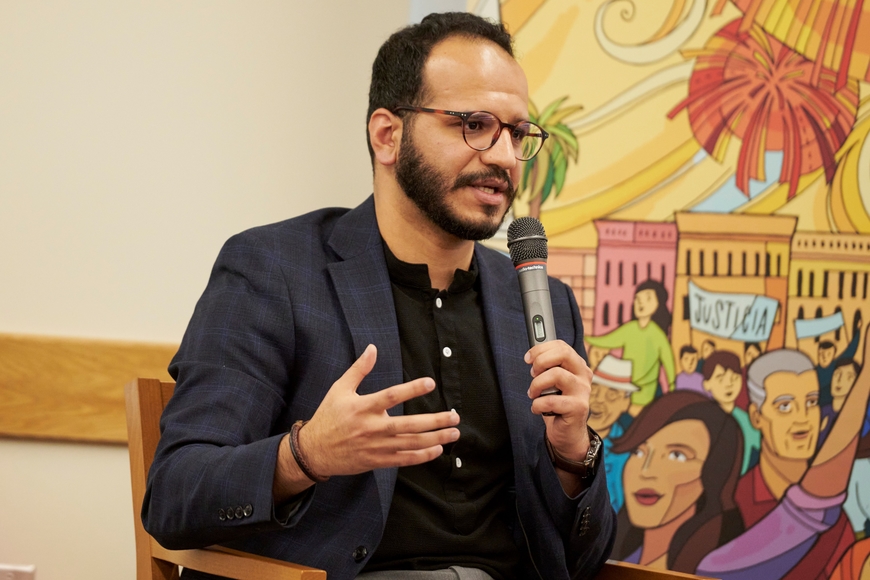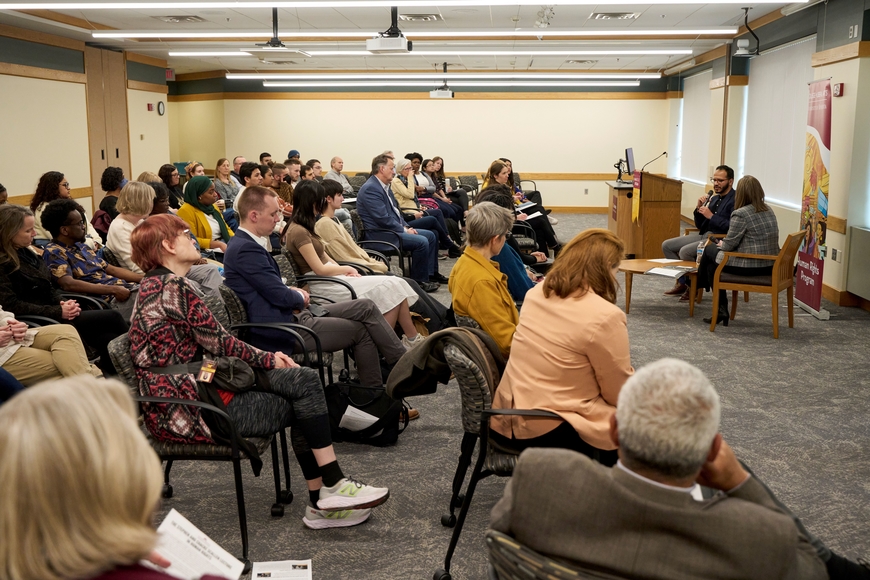Addressing Threats Against Principled Voices
On Thursday, March 14, 2024, Mohamed Mandour, an alumnus of the Master of Human Rights (MHR) Program and currently a Middle East and Northern Africa (MENA) researcher at the Committee to Protect Journalists, gave the Human Rights Program’s sixth Scallen Lecture. “Is the Middle East Able to Speak? A Conversation with Mohamed Mandour on Global Freedom of Expression,” covered the long-standing and timely issue of freedom of expression in the MENA region and around the world.
During the Arab Spring of the early 2010’s, the Internet and social media became essential tools in organized struggles against authoritarian regimes. Newfound access to digital communication platforms changed the way human rights abuses are documented, shared, and used for accountability. Today, these tools have become instruments of oppression by authoritarian governments, who have expanded their repression domestically and exported it beyond their borders—targeting critics, academics, and journalists residing abroad. The result, increased restrictions on global press and academic freedoms, has created a chilling effect on global freedom of expression.
Throughout his conversation with Human Rights Program Director Dr. Carrie Booth Walling, Mandour described how authoritarian regimes exert their control over the digital sphere. Regimes have cut the Internet as a means of control during periods of political upheaval, which makes communication more difficult and masks the events taking place within that country’s borders from the rest of the world. These regimes have also found ways to monitor political dissidents through spyware and citizen reporting mechanisms, seeking to instill fear in journalists and activists before they even have the chance to speak.
Transnational repression has led to human rights violations against citizens who may live entire oceans away from their home country, as authoritarian regimes set up networks of oppression that allow them to exert control and limit speech outside of their borders. If a person cannot be directly targeted, their families may be threatened as a form of indirect control.

Mandour also emphasized the heightened risks for journalists documenting the current atrocities being committed in Gaza. 95 journalists have been killed since the violence in Gaza began after October 7th. This violence against journalists has reached unprecedented levels and has made it more difficult for the world to gain access to credible information on the conflict. Mandour described the importance of journalism in conflict as one of the only ways to fact-check the information citizens are hearing from the government. However, media workers in Gaza continue to face threats to their safety and wellbeing despite being clearly identifiable as members of the press.
Mandour described how the U.S. has often played a role in allowing repression to take place in the MENA region, prioritizing strategic interests over human rights conditions and democracy. The U.S. also remains complicit in the crimes against non-combatants in Gaza, as our government has failed to hold Israel accountable for these crimes and has continued to fund their military operations.
A lively Q&A session followed the lecture. Topics ranged from how intersecting identities affect the rights of journalists, to the ways that journalists and activists have resisted repression. Mandour left the audience considering their role in strengthening global freedom of expression: “We will not be safe if anyone in the world is not safe. We will not enjoy freedom of expression if anyone in the world does not enjoy freedom of expression.”
While he was in town for the event, Mandour also had the chance to speak with current MHR students over dinner and engage with undergraduate students at the HRP Working Group’s Brewing Justice coffee hours, where he shared about his experience as an MHR student and his career as a human rights defender. Attendees also continued the conversation around topics addressed during the Scallen Lecture.
Through the Scallen Lecture and his other events on campus, Mandour shed light on the challenges to freedom of expression world-over, but also the resiliency of those who fight for the truth, and the role we all have to play in advocating for freedom of speech and holding our governments accountable.



